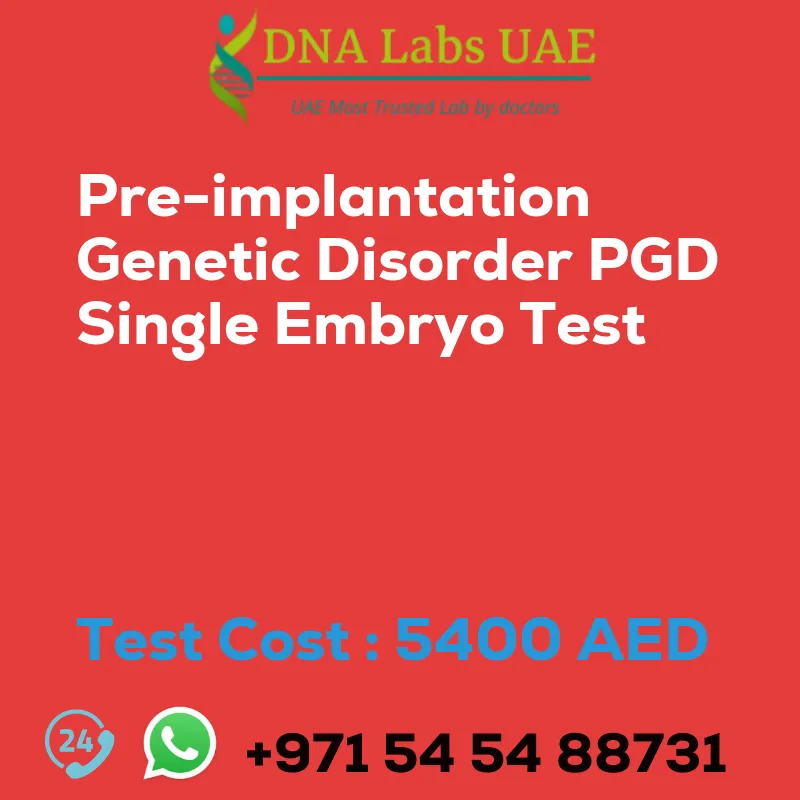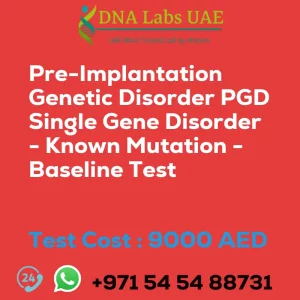Pre-implantation Genetic Disorder (PGD) Single Embryo Test
Test Name: Pre-implantation Genetic Disorder (PGD) Single Embryo Test
Components: Please request collection material
Price: 5400.0 AED
Sample Condition: Trophectoderm
Report Delivery: 15-20 days
Method: Sanger Sequencing
Test Type: Genetics
Doctor: Gynecologist
Test Department: Pre Test Information
Pre Test Information: Pre-implantation Genetic Disorder/PGD (Single Embryo) can be done with a Doctor’s prescription. Prescription is not applicable for surgery and pregnancy cases or people planning to travel abroad.
Test Details:
Pre-implantation Genetic Disorder (PGD) is a technique used during in vitro fertilization (IVF) to identify genetic disorders in embryos before they are implanted in the uterus. PGD is performed on embryos that have been created through IVF and are typically between three and five days old.
During PGD, a single cell is removed from the embryo and analyzed for genetic abnormalities. This cell is then tested for specific genetic disorders that may be present in the embryo, such as cystic fibrosis, sickle cell anemia, or Huntington’s disease. If the embryo is found to be free of the genetic disorder, it is considered a “good” embryo and can be implanted in the uterus.
PGD can be particularly useful for couples who are at risk of passing on genetic disorders to their children. By identifying and selecting embryos that are free of genetic disorders, couples can increase their chances of having a healthy baby. In addition, PGD can also be used to select embryos for gender or to identify genetic disorders that may not be present in the parents but are more common in certain ethnic groups.
However, the use of PGD for non-medical reasons is controversial and has ethical implications. Overall, PGD is a powerful tool that can help couples reduce the risk of passing on genetic disorders to their children. However, it is important to discuss the risks and benefits of PGD with a medical professional before deciding whether to use this technique.
| Test Name | Pre-implantation Genetic DisorderPGD Single Embryo Test |
|---|---|
| Components | Please request collection material |
| Price | 5400.0 AED |
| Sample Condition | Trophectoderm |
| Report Delivery | 15-20 days |
| Method | Sanger Sequencing |
| Test type | Genetics |
| Doctor | Gynecologist |
| Test Department: | |
| Pre Test Information | Pre-implantation Genetic Disorder/PGD (Single Embryo) can be done with a Doctors prescription. Prescription is not applicable for surgery and pregnancy cases or people planing to travel abroad. |
| Test Details |
Pre-implantation Genetic Disorder (PGD) is a technique used during in vitro fertilization (IVF) to identify genetic disorders in embryos before they are implanted in the uterus. PGD is performed on embryos that have been created through IVF and are typically between three and five days old. During PGD, a single cell is removed from the embryo and analyzed for genetic abnormalities. This cell is then tested for specific genetic disorders that may be present in the embryo, such as cystic fibrosis, sickle cell anemia, or Huntington’s disease. If the embryo is found to be free of the genetic disorder, it is considered a “good” embryo and can be implanted in the uterus. PGD can be particularly useful for couples who are at risk of passing on genetic disorders to their children. By identifying and selecting embryos that are free of genetic disorders, couples can increase their chances of having a healthy baby. In addition, PGD can also be used to select embryos for gender or to identify genetic disorders that may not be present in the parents but are more common in certain ethnic groups. However, the use of PGD for non-medical reasons is controversial and has ethical implications. Overall, PGD is a powerful tool that can help couples reduce the risk of passing on genetic disorders to their children. However, it is important to discuss the risks and benefits of PGD with a medical professional before deciding whether to use this technique. |








